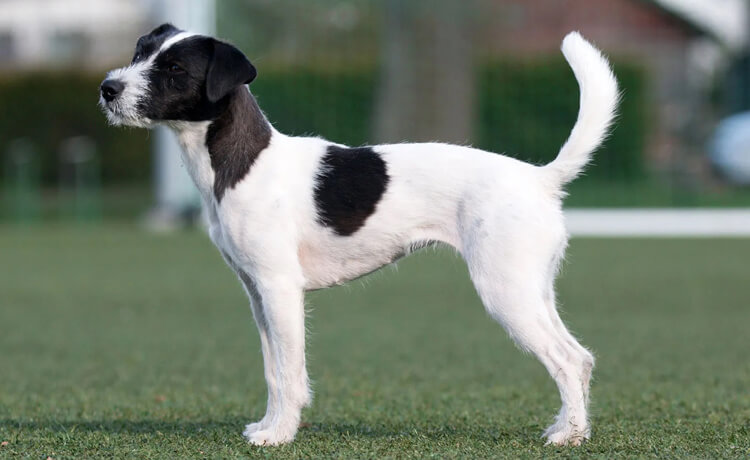
Parson Russell Terrier
The Parson Russell Terrier is a small but powerful breed known for its boundless energy, sharp intelligence, and unwavering loyalty. Originally bred for hunting, this terrier thrives in active households and loves engaging with its family.
Key Features of the Parson Russell Terrier
-
Size and Appearance:
- Height: 13–14 inches.
- Weight: 13–17 pounds.
- Coat: A weatherproof coat available in smooth or broken textures, predominantly white with black, tan, or tri-color markings.
- Distinctive Features: A strong, athletic body, expressive dark eyes, and a high-set tail that reflects their enthusiasm.
-
Temperament:
Parson Russell Terriers are fearless, playful, and alert. They are highly social and form strong bonds with their families. -
Energy Level:
Exceptionally high, making them a great match for active individuals or families.
History and Origin of the Parson Russell Terrier
-
Developed in England:
The breed’s origins trace back to the early 19th century when Reverend John “Jack” Russell of Devon, England, developed the Parson Russell Terrier for fox hunting. -
Fox Hunting Specialist:
The Parson Russell was bred to chase foxes into their dens, assisting hunters with precision and determination. -
Recognition and Name:
Officially recognized by the American Kennel Club (AKC) in 1997, the breed’s name distinguishes it from the closely related Jack Russell Terrier, which is slightly smaller and less squarely built.
Exercise and Training Needs
-
Daily Exercise:
Parson Russell Terriers are highly energetic and require at least 60 minutes of exercise daily. Activities such as running, agility courses, or playing fetch can help meet their physical needs. -
Mental Stimulation:
Intelligent and curious, they thrive on puzzle toys, training sessions, and interactive games. Keeping them mentally engaged prevents boredom and destructive behavior. -
Training Tips:
- Positive Reinforcement: Use treats, praise, and play to reward good behavior.
- Consistency is Key: These terriers can be independent thinkers, so consistent training is essential.
- Early Socialization: Expose your Parson Russell Terrier to various environments, people, and other pets to nurture a well-rounded personality.
-
Behavioral Traits:
Their strong prey drive may lead them to chase small animals. Always leash them or ensure a secure yard when outdoors.
Grooming and Coat Care
Essentials for Your Newly Adopted Pet
Welcoming a shelter pet into your life is a beautiful journey. Here are some handpicked items to help your new friend feel safe, loved, and right at home:
-
Coat Maintenance:
The Parson Russell Terrier’s coat is relatively low-maintenance:- Brushing: Brush their coat 1–2 times a week to remove loose hair and maintain cleanliness.
- Bathing: Bathe as needed, typically every 6–8 weeks, or when they get dirty.
-
Other Grooming Needs:
- Ears: Clean weekly to prevent buildup and infections.
- Nails: Trim regularly to avoid overgrowth.
- Teeth: Brush several times a week to ensure dental health.
Health Considerations
-
Lifespan:
Parson Russell Terriers typically live 13–15 years. -
Common Health Issues:
While generally healthy, some may be prone to:- Patellar Luxation(kneecap dislocation).
- Deafness(in certain lines).
- Lens Luxation(an eye condition).
- Ataxia(a rare neurological disorder).
Regular veterinary check-ups and a nutritious diet are key to their overall health.
Fun Facts About the Parson Russell Terrier
-
An Excellent Jumper:
Parson Russell Terriers are known for their incredible jumping ability, making them stars in agility competitions. -
Fox Hunter’s Dream:
Reverend Jack Russell bred this terrier to hunt foxes efficiently, both above and below ground. -
Different from the Jack Russell Terrier:
While similar, the Parson Russell Terrier is taller and more squarely built than the Jack Russell Terrier. -
Celebrity Appeal:
Parson Russell Terriers have appeared in movies and TV shows, showcasing their intelligence and charm. -
Loyal and Fearless:
Despite their small size, they are fiercely loyal and fearless, often standing their ground against larger animals.
Is the Parson Russell Terrier Right for You?
The Parson Russell Terrier is an excellent choice for active individuals or families who can provide the exercise and stimulation this lively breed requires. They thrive in environments where they are given plenty of attention and opportunities to burn off energy.
If you’re ready to embrace their adventurous spirit and keep up with their energetic lifestyle, the Parson Russell Terrier will reward you with loyalty, affection, and endless fun!
Affiliate Products
Up to 75% Discount

Dog Collar with Health Monitoring
BUY NOW »
Up to 55% Discount

Luxury Faux Furhuge Napping Bed
BUY NOW »

